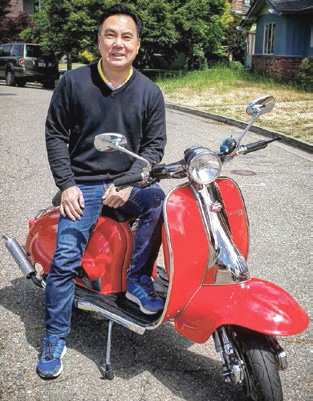Scooters are for Riding - Page 4
 |
|
|
"It's a great way to get out and de-stress for me. When I'm riding the bike, I'm not thinking about problems at work, anything that might cause stress," Palmer says.
There are hundreds of scooter clubs in the United States, ranging from dozens to hundreds of members—some local, some nationwide in scope. Clubs put on rallies that can feature daylong rides or two- or three-day rides that cover hundreds of miles, with parties and dinners in the evening.
Many are open to vintage scooters only. Some allow owners of newer models. Vespas are still being produced, and vintage owners concede that they're easier to maintain, function better, and, with four stroke engines (not two), pollute much less.
But the new ones don't appeal to vintage scooter lovers who enjoy working on their own bikes and appreciate the nostalgia.
Some scooter clubs even allow the occasional motorcycle to attend.
Many scooter owners have motorcycles as well, but there can be tensions, Llamas says. "Most motorcyclists look down on scooters as second-rate, effeminate vehicles. You have to not care, if you ride on a scooter. You have to be able to handle it."
 |
Through clubs, Paul Sachelari says, "I have become really good friends with people. It's a way of making connections with people you have a lot in common with. There's a lot of overlap in music, art, literature we like. A certain type of personality tends to gravitate to vintage stuff."
"People come from all walks of life," Palmer says. "The common thread is, we all grew up with this stuff." There are more men than women in the scooter clubs. Janel Holiday tries to counter that by encouraging women to ride. One club she belongs to is all women. Thanks to it, she has good friends across the country.
Scooter people tend to be in their 40s and 50s—which means many have aged out of three-day, 850-mile scooter club rides. This also leads to worries about the hobby's future.
"Baby Boomers are the plumpest chunk of the market. Millennials and Gen Xers just aren't into motorcycling or scootering," Dean Seven says.
Many young people don't seem to want to tinker. "It takes work to maintain a vintage vehicle," Sachelari notes.
"It's hard for young people to get involved, because prices for vintage scooters have really gone up," Llamas says. Today's buyers, he says, are mainly "people in their 40s who have more income and can buy what they wanted to get when they were 18."
Photography: Ryan Bula (Sharplite Media), Dez Cobb, Craig Howell, Kathy Langston, Joe Barthlow, John Palmer, Richter Design, Jim Parrott; and courtesy Jim Palmer, Black Sheep Scooter Club, Pelayo Llamas, Janel Holiday, Dean Seven, Bello Moto, Rico Tee Archive




